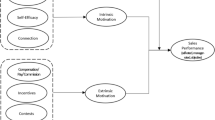Abstract
Inexperienced sales professionals face high probability of failure, especially in the exploration stage of their career (Cron and Slocum 1986; Dixon et al. 2005). As a result, their learning and performance orientation along with their supervisors’ support is key to their motivation and success (Dixon et al. 2003; Kholi et al. 1998; Sujan et al. 1994). This research investigates an unexplored area of the attribution theory which should help young salespeople, sales managers, and sales educators understand better the relationship between believing in luck and becoming successful.
The theory of attribution plays a major role in helping understand how sales professionals react to failure and bounce back (e.g., Dixon et al. 2001). The theory also is of particular importance in education to analyze how learners interpret performance and redirect effort (Weiner 1979). The attribution theory is concerned with individuals’ search for causes of their failures and successes; a natural tendency to redirect effort on appropriate behavior en route to improved performance (Heider 1958; Kelley 1967). Three central causal dimensions have been discerned, namely stability, locus, and controllability (Weiner 1979). Stability refers to the extent to which the cause of failure or success is perceived as being stable (native ability or task difficulty), or unstable (effort or luck). Locus deals with one’s perception of the location of the cause, namely internal (native ability or effort), or external (task difficulty or luck). Finally, controllability relates to individuals’ perception of their ability to affect their achievement by controlling the cause (effort), or not (native ability, task difficulty, and luck). Consequently, the attribution theory considers luck as an unstable, external, and uncontrollable cause of individuals’ achievement (Kelley 1967; Weiner 1979). Research on the instrumental impact of luck on sales outcomes is scarce, yet it is an essential topic since the very nature of the market environment, competitors, and customers, leave salespeople in the face of numberless instable, external, and uncontrollable sources of uncertainty and failure (Le Bon 2014). We propose a model to capture the potential influence of accidental luck and provoked luck on young salespeople’s performance. We suggest that salespeople’s effort as reflected in their activities influence sales opportunities. In turn, sales opportunities open fortuitous and auspicious situations leading respectively to accidental luck and provoked luck. Accidental luck and provoked luck are then hypothesized to provide positive outcomes such as sales performance. We control for regular sales process which also influences sales performance.
Findings show that accidental luck and provoked luck impact sales performance, along with regular sales process. To the best of our knowledge, this research is the first to separate luck into two dimensions – accidental and provoked – and examine its effect on sales performance. Although considered as an unstable, external, and uncontrollable cause in the attribution theory, luck should be viewed as a manageable determinant of personal achievement. Such findings call for a deeper understanding of how luck could be integrated into sales performance theories and reinforce salespeople’s self-determination, motivation, and success.
Access this chapter
Tax calculation will be finalised at checkout
Purchases are for personal use only
Similar content being viewed by others
Author information
Authors and Affiliations
Corresponding author
Editor information
Editors and Affiliations
Rights and permissions
Copyright information
© 2016 Academy of Marketing Science
About this paper
Cite this paper
Le Bon, J. (2016). Engaging Inexperienced Salespeople to Work Hard to Be Lucky: Towards the Attribution of Sales Performance to Luck. In: Obal, M., Krey, N., Bushardt, C. (eds) Let’s Get Engaged! Crossing the Threshold of Marketing’s Engagement Era. Developments in Marketing Science: Proceedings of the Academy of Marketing Science. Springer, Cham. https://doi.org/10.1007/978-3-319-11815-4_173
Download citation
DOI: https://doi.org/10.1007/978-3-319-11815-4_173
Publisher Name: Springer, Cham
Print ISBN: 978-3-319-11814-7
Online ISBN: 978-3-319-11815-4
eBook Packages: Business and ManagementBusiness and Management (R0)




